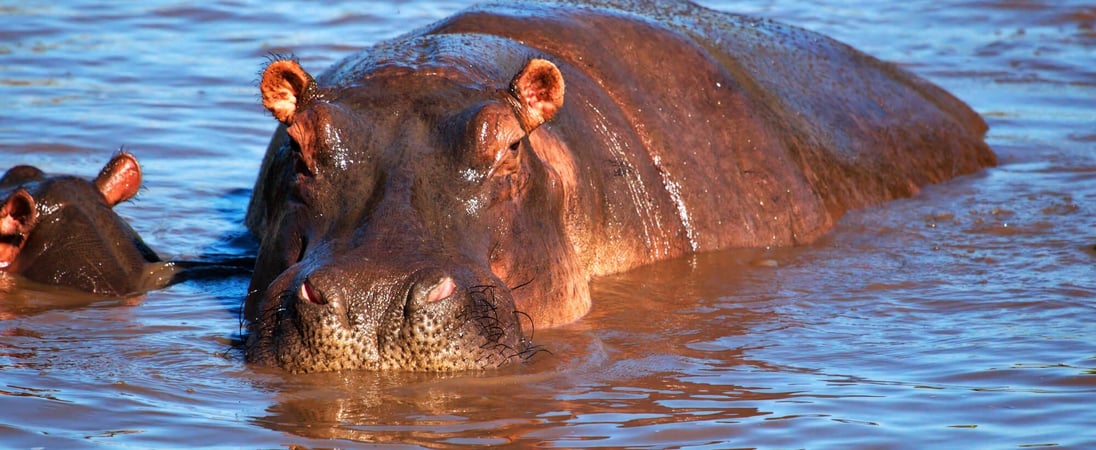
World Hippo Day
These adorable creatures spend their days splashing in the water, munching on grass, and wowing us with their powerful jaws!
Fancy waddling in a mud bath, getting angry with some tourists and yawning a lot while opening your mouth really, really wide? Then World Hippo Day, a chance to celebrate these water-loving creatures, sounds like the perfect occasion for you!
Hippos have long been celebrated in Africa, revered by Zulu warriors for their bravery, often featured in African folktales and the image of the Ancient Egyptian goddess Taweret. You can help continue this long standing tradition by observing World Hippo Day!
How to Celebrate World Hippo Day
Visit Some Hippos at the Zoo
Perhaps the best way to celebrate World Hippo Day is to go and see some for yourself. Head on over to your nearest zoo or safari park and check out the hippo exhibit. They’ll usually have lots of fascinating information on display, and it’s a great way to get up close and personal with hippos while also contributing to conservation efforts. Just be warned that their enclosures can be rather smelly, so it might be worth taking a peg with you as backup!
Go On Safari
If you’re a serious animal lover and are able to travel, why not go on safari? There are plenty of companies and experienced guides offering safari tours and holidays, allowing you to see a range of wildlife inhabiting the grasslands, savannahs and wetlands of Africa, including hippos!
Enjoy Wildlife Photography
Even if you’re not able to see hippos in person, there are still plenty of ways to enjoy these large animals. Check out some wildlife photography and paintings at a local gallery or scour the internet for pictures, documentaries and video clips.
Play Hippo Games
If you have kids (or even if you’re fully grown!), why not play a game of Hungry, Hungry Hippos? This popular game has been around since the 70s and involves each player getting their hippo to gobble up as many marbles from the pond as possible. Give it a whirl and see how you fare against family and friends!
Watch a Movie With Hippos
There are also a variety of films and songs featuring hippos. Disney’s Fantasia features a ballet-dancing hippo, while the movie Madagascar sees the hippo Gloria and her three friends transported from Central Park Zoo to the titular country.
Listen to Hippo Themed Songs
Gayla Peevey’s “I Want a Hippopotamus For Christmas” was a big hit in the 1950s, and Flanders and Swann wrote a couple of hippo-themed tunes including the “Hippo Encore”, which contains the famous lines, “Mud, mud, glorious mud!” Plenty of options for a movie night or a singalong!
Donate to a Hippo Charity
And if you’d like to help ensure there’s plenty of hope for the hippo, then you can also donate to a charity that works to protect these creatures. The World Wildlife Fund, Pygmy Hippo Foundation, and the African Wildlife Foundation are just a few of the many helpers of hippos.
History of World Hippo Day
Experts believe that the modern-day hippo evolved in Africa around 8 million years ago. While they bear a resemblance to horses and pigs, these semi-aquatic mammals are in fact most closely related to whales, dolphins and porpoises – no wonder they’re so good at holding their breath underwater!
These days there are only two types, the bog-standard hippopotamus and the smaller pygmy hippopotamus, but a few other now extinct species could be found across Europe and in Madagascar as little as 1,000 years ago. Hippos are now most common in countries such as Zambia and Tanzania.
In the 20th century, attempts were made to introduce hippos into the US. The “American Hippo Bill”, raised in 1910, proposed introducing hippo ranching in Louisiana, not only to help control a particular plant that was taking over the bayous but also to address the American meat crisis.
However, the bill didn’t quite make it through Congress, so hippos remained in their native Africa until the 1980s, when the infamous drug cartel leader Pablo Escobar (illegally) imported four hippos and took them to his estate in Columbia. Their numbers have increased dramatically since, perhaps to as many as 100! While the hippo has become a symbol of the area, their inability to be managed continues to cause significant issues for the local authorities.
In Africa, on the other hand, hippo numbers are sadly declining. The International Union for Conservation of Nature (IUCN) listed them as a vulnerable species in 2006 after establishing that the hippo population had declined by as much as 20% within the previous two decades. Drought has led to habitat loss, and the hunting and poaching of hippos, both for their meat and ivory teeth, is also a major threat.
World Hippo Day reminds us to celebrate and value these mud-loving mammals, in the hope that they’ll be around for many more years to come.
World Hippo Day Timeline
7.5 million years ago
Modern hippos originate
With ancestors that likely preceded them by 8 million years or so, scientists have dated hippos of the modern aspect around this time.[1]
4400
BC Ancient Egyptians hunt hippos
Sought after for their skins, meat, fat and enormous teeth, hippos were hunted by ancient Egyptians. Depictions of such scenes reveal a hunter in a small boat with a harpoon.[2]
1849
Pygmy Hippo is discovered
Originally deemed unique enough for its own genus, the Pygmy Hippo is dubbed the Choeropsis. This version is much smaller than the common hippo, weighing only around 400 to 600 pounds.[3]
1928-1931
Huberta the hippo wanders through South Africa
Originally named ‘Hubert’ because no one could determine the gender until after her death, Huberta leaves her watering hole. She wanders at least 1600 km over the next three years, through farmland, towns and neighborhoods. Although she is considered a protected animal, she is eventually shot by farmers in 1931.[4]
2017
Fiona, the premature hippo, is born
Born prematurely at only 29-pounds, less than half the normal weight of a typical newborn, Fiona is the smallest hippopotamus to survive. She lives at the Cincinnati Zoo and Botanical Garden and weighs 1600 pounds on her fourth birthday.[5]
Hippo Facts: Did You Know…?
The word hippopotamus loosely translates as “river horse” from Ancient Greek. It’s certainly an apt name, as these creatures spend most of their lives in water, only leaving at dusk to feed on grasses. They can hold their breath for up to 5 minutes, which means they’re even able to give birth and sleep underwater.
In fact, in much the same way that breathing and blinking are automatic for us humans, hippos know when to surface for oxygen subconsciously, so they come up regularly for breaths even while staying fast asleep!
Although these mammals spend a considerable amount of time underwater, you may be surprised to learn that they can’t really swim! Instead, they simply walk or run along the riverbed, pushing themselves up through the water for air.
One of the main reasons hippos spend so much time submerged underwater is to prevent their skin from drying out and cracking under the hot sun. This is also why they love frolicking in mud, as the slimy substance helps keep them cool!
But the hippo even goes one step further to protect itself from the sun’s rays, secreting an acidic substance that acts as natural sunscreen. This nifty protection mechanism, which turns red and then brown once exposed to the air, not only blocks ultraviolet rays but also prevents the growth of potentially harmful bacteria.
Hippos are renowned for their bulky size, with only elephants and rhinos ranking ahead of them as the largest land mammals. An adult male can reach a whopping 2,000kg and still manage to run at speeds of almost 20mph!
This, combined with their aggressive nature and large canine tusks, makes hippos very dangerous animals. There are many instances of hippos attacking boats, with some people sustaining injuries or very sadly losing their lives. Great care should therefore be taken when encountering them in the wild.
World Hippo Day FAQs
Are hippos dangerous?
Yes, hippos can be dangerous. In fact, they are the world’s deadliest large land mammals and each year they kill around 500 humans in Africa. Hippos are aggressive, with huge sharp teeth and around 3,000 pounds of weight to throw around.[1]
What do hippos eat?
While much of their diet seems to consist of grasses in the rivers where they live, hippos are actually omnivores who will also eat meat fairly regularly.[2]
How big is a hippo?
The average size of the common river hippo (hippopotamus amphibious) is around 3,000 pounds for a female and 3,500 pounds for a male. They are approximately 5 feet tall and between 10.8 and 16.5 feet long.[3]
How many types of hippos are there?
While some from long ago have gone extinct, modern hippos only have two types: the larger common hippopotamus and the smaller pygmy hippopotamus.[4]
Also on ...
View all holidaysSingles Awareness Day
Enjoying the freedom to focus on personal goals, hobbies, and friendships without the compromise of a partner's preferences or schedule.




